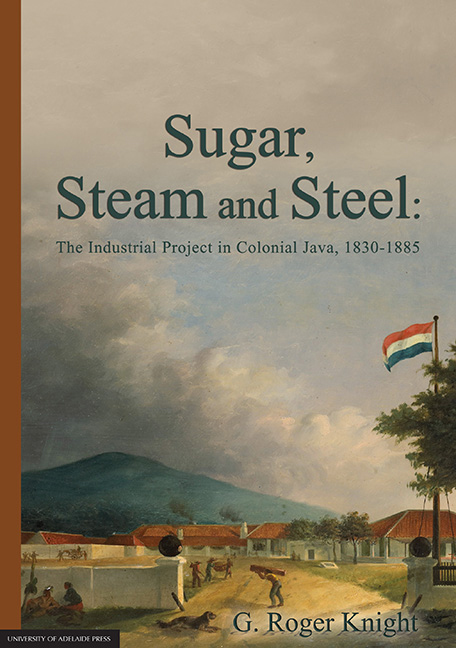Book contents
- Frontmatter
- Contents
- Abbreviations and Glossary
- Acknowledgements
- Introduction: Java Sugar, an Industrial Project and the ‘Oriental Cuba’, 1830-85
- Part I The ‘Industrial Revolution’ in Sugar Manufacture
- 1 Java's Singular Trajectory: Steam, Steel and the Industrial Project in Sugar
- 2 A Creole Prometheus: Steam, Paddle Boats and Sugar Factories
- 3 The Industrial Sugar Factory: Wonopringgo, Thomas Edwards and the Nederlandsche Handel-Maatschappij (NHM)
- Part II The ‘Peasant’ Economy, the Money Trail and the Bourgeoisie
- Part III Metamorphosis
- Conclusion: The Future of an Industrial Project: The 1880s and Beyond
- Archival Sources
- Bibliography
2 - A Creole Prometheus: Steam, Paddle Boats and Sugar Factories
from Part I - The ‘Industrial Revolution’ in Sugar Manufacture
Published online by Cambridge University Press: 24 October 2017
- Frontmatter
- Contents
- Abbreviations and Glossary
- Acknowledgements
- Introduction: Java Sugar, an Industrial Project and the ‘Oriental Cuba’, 1830-85
- Part I The ‘Industrial Revolution’ in Sugar Manufacture
- 1 Java's Singular Trajectory: Steam, Steel and the Industrial Project in Sugar
- 2 A Creole Prometheus: Steam, Paddle Boats and Sugar Factories
- 3 The Industrial Sugar Factory: Wonopringgo, Thomas Edwards and the Nederlandsche Handel-Maatschappij (NHM)
- Part II The ‘Peasant’ Economy, the Money Trail and the Bourgeoisie
- Part III Metamorphosis
- Conclusion: The Future of an Industrial Project: The 1880s and Beyond
- Archival Sources
- Bibliography
Summary
During the middle decades of the nineteenth century, Prometheus came to Java, and did so in the shape of the technologies of steam, iron and (eventually) steel. In so far, moreover, as it invoked colonial ingenuity and invention as well as metropolitan transfer, Prometheus took on a distinctively Creole, hybrid character. As one recent writer has remarked of technology (and much else):
the Netherlands East Indies is such an alluring place to study, because it appears to exist simultaneously at the further reaches of modernity and close to its most dynamic centre.
His point provides an apt motif for what follows, specifically in its applicability to the men and machines not only of the colony's sugar industry in the mid-nineteenth century but also of the larger imperialism of which they formed an essential part. The history of the Dutch colonial presence in nineteenth-century Java has been occluded to a degree by notions of a Tempo Doeloe — literally a ‘time past’, but with similar connotations to the myth of the ante-bellum American South — which became the subject for a deal of post-colonial nostalgia in the Netherlands itself. On this reading, a largely ‘pre-modern’ order prevailed in the colony during the middle decades of the nineteenth century and was swept away only toward the century's end by economic crises and a sharp increase in the inflow of European capital and, subsequently, of self-consciously ‘expatriate’ personnel. The colony was not the sort of place, in short, where an industrial project was likely to thrive: on the contrary, in such a location sugar production was likely to be a thoroughly old-fashioned affair.
In fact, nothing could be further from the truth. Metropolitan Holland itself may have been slow to take up the advances of the industrial revolution. In its Asian colony, however, Prometheus was clearly in evidence on the frontiers of Dutch power in the Indonesian archipelago by the middle decades of the century.
Paddle Boats and Sugar Factories
In the West, the nineteenth-century advance of steam and steel came to be epitomised in the cotton mill, at least in so far as the sphere of large-scale commodity production was concerned. Worldwide, on the other hand, the major connotations of steam power in the mid-century decades arguably had more to do with transportation (including its military applications), in the form of railway engines and steam boats.
- Type
- Chapter
- Information
- Sugar, Steam and SteelThe Industrial Project in Colonial Java, 1830-1885, pp. 33 - 62Publisher: The University of Adelaide PressPrint publication year: 2015



